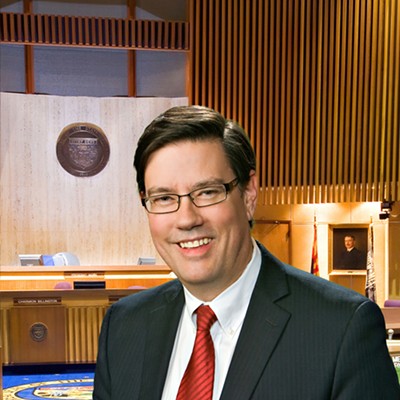Wednesday, February 19, 2014
Senate Passes Controversial Religious Freedom Bill
After shutting down 8 floor amendments from the Democrats, the Republicans passed SB 1062 through the Senate today.
The bill would provide protection for business owners if they refuse a customer because serving him or her would violate their religion.
Republicans insist that the bill is simply intended to protect the first amendment rights of Arizona citizens, but Democrats claim that the bill will just enable businesses to discriminate against the LGBT community.
“The one thing that no one can stand up and dispute is that fact that the heart of this bill would invite discrimination against gays and lesbians, bottom line.” Sen. Steve Gallardo (D-Phoenix) said.
The Democrats called for a head count when Gallardo’s amendment that would prevent discrimination against people for their gender, gender identity or sexual orientation was struck down verbally and lost 16-12.
Sen. Ed Ableser (D-Tempe) attempted a no holds barred attack to change the language of the bill—more as a way to point out the flaws in the language than to actually get anything passed.
The first of the 6 amendments he proposed attempted to change the definition of person to “A bipedal primate to which modern humans belong characterized by the brain capacity averaging 85 cubic inches and the dependency on language and the creations and use of complex tools” because he opposed Sen. Steve Yarbrough’s (R-Chandler) loose definition of “person” in the bill.
“I think we can all agree to that, that’s it not bricks and mortar that makes a person, it’s actually brain activity and opposable thumbs,” Ableser said.
That was the beginning of a long string of democratic amendments that were shut down by the republican majority, ending with one that tried to exclude Satanism from the freedom of religion.
“One of them says if a guest in your lair annoys you, treat him cruelly and without mercy.” Ableser said, referencing the satanic principles. “Now many of you might be feeling that towards me today, but I would assert that that is not a true free exercise of religion.”
The only amendment that passed was a sponsored by the Republican Yarbrough. The Amendment tightened up the language of the bill so that a person had to be truly committed to their religion.
“This bill is not about allowing discrimination. It’s about preventing discrimination against people who are living out their faith as clearly contemplated by the first amendment.” Yarbrough said.
The democrats weren’t listening.
“I don’t argue that folks have the right to religious freedom,” Gallardo said. “I think we all have the right to our religious beliefs. But I do not agree that we have the right to discriminate because of our religious beliefs.”
Yarbrough thought that the discrimination claims that the Democrats kept bringing up were an exaggeration of what the bill would do.
“It would really be helpful if folks might understand and appreciate that reality rather than creating or talking, frankly, about completely unrealistic and unsupportable hypotheticals which clearly are not an issue.” Yarbrough said.
By the end, the Democrats focused on how they felt that the bill would negatively affect the economy.
“I’ve been around a long time,” said Sen. Lynne Pancrazi (D-Yuma). “I remember when Mecham refused to recognize Martin Luther King Day. Then I remember 1070, both of which caused economic damage to the state of Arizona in their time. Now we have this.”
Senator Steve Farley (D-Tucson) ended his closing arguments with a passionate speech about how important diversity is for the country and for the economy.
“I believe our economy is strengthened by different people, and different backgrounds, and different beliefs, and different motivations, coming in and working together in our economy to make this state and this country stronger,” Farley said. “Discrimination hurts that. It hurts that in so many different ways.”
However, it was the Republicans who had the last say when they voted the bill down 17-13.
“I would just suggest that if there is going to be a backlash because of SB 1062, it won’t be because someone has rationally read the contents of this bill and recognizes that it is indeed tailored after supreme court cases dealing with first amendment religious rights. It will be because of the temperament and inaccurate rhetoric,” said Senate President Andy Biggs when he explained his vote, effectively sending the bill to the House of Representatives.
Tags: Steve Farley , Ed Ableser , Steve Yarbrough , SB 1062













